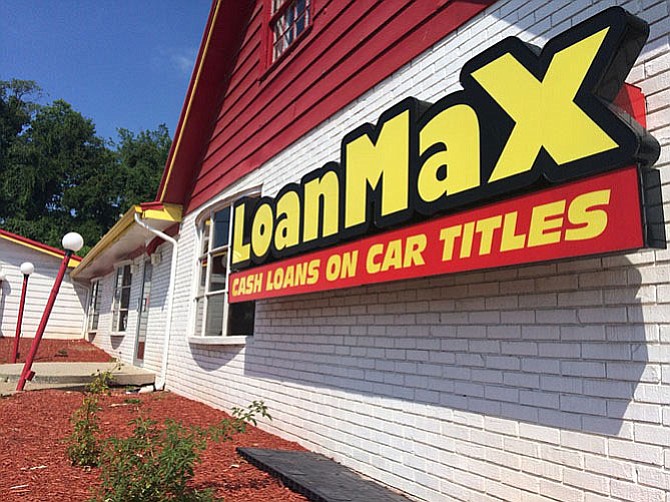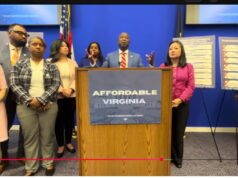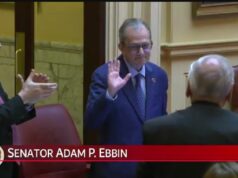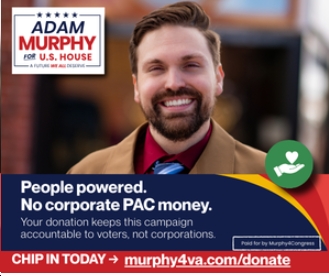 “’It’s not predatory,’ says Senate Democratic Leader Dick Saslaw, who has taken about $37,000 from TitleMax in the last decade. He says if people…didn’t have access to businesses like TitleMax, they would find other ways to get the money.” – WAMU, 2015
“’It’s not predatory,’ says Senate Democratic Leader Dick Saslaw, who has taken about $37,000 from TitleMax in the last decade. He says if people…didn’t have access to businesses like TitleMax, they would find other ways to get the money.” – WAMU, 2015
Societies are weighted down by corruption when their leaders cut too many deals with wealthy interests and cut too many corners to consummate those deals. Ultimately, such corruption manifests itself in ways that you can see before your very eyes.
Like, say, the long line of storefronts on major Virginia roads with names like Titlemax, Loanmax and Advance America. These are the predatory lending firms that have sprouted up in Virginia because the General Assembly – with major leadership from Senate Democratic Leader Dick Saslaw – invited them in.
Even as a majority of other U.S. states have done a better job of reining in – if not outright banning – predatory lenders, Virginia has consistently allowed enough loopholes for this industry to thrive.
It is not hard to trace which elected officials have gotten the largest donations from this industry, and in exchange have done the most to help it get away with its dirty work. That list includes Republican Delegate Tim Hugo – who most certainly needs to be beaten by Dan Helmer this year.
But all roads in Virginia’s winding predatory lending story ultimately lead back to Dick Saslaw, sponsor or supporter of many of these bills and the top recipient of the industry’s largess. The over $300,000 in donations that Saslaw has received from the Consumer Credit/Payday Loans industry since 1996 includes: $78,000 from Anderson Financial Services/LoanMax; over $44,000 from Community Loans of America; $39,500 from TitleMax; over $27,000 from Advance America Cash Advance; and over $23,000 from Check into Cash of VA.
It’s no exaggeration to say that the predatory lending industry harvests money from Virginia’s poor, sending a portion to Saslaw’s pockets to keep the heist going. And that is a problem for a Democratic party determined to live up to its reputation as the party of the people, not the predators.
A Sordid History
Journalist Michael Pope did a superb series for local public radio station WAMU in 2015 tracing the history of the predatory lending industry in Virginia. This industry has two major faces in the Commonwealth, based on the limited forms of collateral their lower income targets have to offer:
- Payday lenders, who use the promise of your next paycheck for their loans;
- Car title lenders, who use your car as collateral.
The Virginia General Assembly legitimized the former in 2002 with the Payday Lending Act, causing the volume of such lending to expand eight-fold by 2008, to about $1.3 billion. Annual interest rates ballooned as high as 800% before the legislature capped them at 36% in 2008.
Before long, however, the predatory lending industry was lobbying for official sanction for another of its practices – car-title lending, which was pitched as “safer” because it involved actual collateral that could be repossessed: the borrower’s car. Never mind that doing so can cripple the ability of poor borrowers to make a living in a region where long commutes may be unavoidable.
Once again, official government sanction caused this form of lending to skyrocket – notably after 2011, when the General Assembly passed a truly unconscionable bill, sponsored by Dick Saslaw, allowing Virginia predatory lenders to target borrowers in surrounding states, like D.C., Maryland and North Carolina, where car-title lending is illegal. After that, car-title lending locations in Virginia exploded by 500% — believable if you count the number of such storefronts clogging Northern Virginia thoroughfares like Routes 1 and 7.
Many studies have documented how the business model of predatory lenders is based on trapping low income people in cycles of debt that regularly end up costing them more than they sought to borrow in the first place. The Consumer Financial Protection Bureau (CFPB) found the median payday loan borrower taking out TEN such loans from a single lender in a year, thereby being forced to pay $458 in fees alone for the original $350 in loan principal. The Center for Responsible Lending found such “loan churn” to account for an astounding 82% of payday loan volume.
Payday loans are based on the premise that a borrower will repay the loan in two weeks once their next paycheck – to the value of which the lender claims a legal right – has cleared. In fact, the quick repayment period, balloon payment and high interest rates combine to make repayment very difficult for people who, by definition, are having trouble making ends meet.
As for car title loans, TitleMax admitted in court that the typical car title loan is refinanced 8 times, while 2012 data from Virginia found almost 10% of borrowers’ cars getting repossessed.
Defending the Indefensible
All of these facts contradict the soothing rhetoric from the industry that they are doing their customers the huge favor of giving them access to credit. Sen. Dick Saslaw has consistently parroted these misleading claims.
The Community Financial Services Association claims that its members’ predatory practices save low-income consumers from bank overdraft fees, bankruptcy and “seeking out illegal, offshore, or unregulated lenders.” Dick Saslaw often repeats such lines in defending his legislative actions to keep predatory lenders in business – e.g., per the Daily Press in 2016, “Saslaw said he’s worried that if payday and car title lenders are driven out of the state, that would simply open the door to loan sharks.”
In a 2011 appearance on the Kojo Nnamdi show, Saslaw defended his bill allowing car-title lenders to target borrowers in neighboring states with the statement: “They’re going to borrow that money, Kojo, one place or another.” He then proceeded to browbeat Del. Glenn Oder, a Republican with a sharper moral compass on predatory lending than the Democratic leader of the state Senate.
That year, consumer groups protested Saslaw’s actions – as Ben Greenberg, Legislative Director of Virginia Organizing, put it: “The Senator has worked to quash every bill introduced in the Senate that would have put reasonable ceilings on interest rates to help and protect Virginia consumers.” In response, Saslaw told the Virginian-Pilot that consumer groups that complained about this legislation were “looking out for people who don’t live in Virginia, which quite frankly is none of their business” – a remarkable statement showing how he thinks we should treat our neighbors.
As the opening quote to this diary shows, Saslaw does not consider this industry “predatory” despite its business model requiring trapping poor people in cycles of debt that cause them to pay more than they originally sought to borrow. To slightly revise Upton Sinclair’s famous quote, it seems difficult to get a man to understand something when his political donations depend upon his not understanding it.
Why Saslaw Needs to Go
This could just be another story about yet another unseemly practitioner of pay-to-play politics, but the larger problem is that Saslaw, thanks to his powerful position as Democratic State Senate Leader, has spread his form of corruption to the party as a whole.
Lots of Virginia Dems understandably appreciate his many contributions to them and their causes over the years. In the process, many of them have chosen to look the other way and not think about the sources of all that cash.
But no industry gives out money for free – they all expect and demand payback in the form of legislative and regulatory benefits. It is not hard to draw a line from corporate contributions given to powerful Virginia politicians like Saslaw directly to policies that hold Virginia back in countless ways.
You can connect the dots from contributions given by Dominion Energy ($300,000+ to Saslaw since 1996) and coal companies like Alpha Natural Resources (over $73,000 to Saslaw) to Virginia’s position in the bottom tier of states on clean energy. You can map the links from donations given by Altria ($75,000 to Saslaw) to Virginia having some of the lowest cigarette taxes in the country.
The days when Virginia Dems could explain away such anti-consumer, anti-public health, anti-environmental positions by mumbling about “the Virginia Way” and this being a conservative Southern state, etc. are over. The increasingly blue tint of the Commonwealth demands that we be true to our Democratic principles – and that we stop allowing destructive corporate practices not tolerated in many other states, including transparently predatory lending practices that drive already poor Virginians into bankruptcy.
It’s time for a New Virginia Way, one that puts the needs of our citizens before the cynical transactions of industries that exploit both our government and residents. But that will require replacing pay-to-play politicians like Dick Saslaw, who is currently in a primary battle against a candidate dedicated to honest progressive politics – Yasmine Taeb, a civil rights lawyer and elected member of the Democratic National Committee.
Electing Yasmine Taeb over Dick Saslaw to represent the 35th Senate District will allow Democrats and Virginians to get beyond our shameful record on predatory lending and bring a new day of hope to those who simply want to get ahead without being exploited. We can do better — let’s not miss this opportunity to do so.
Cross-posted at Daily Kos











![Friday News: “As Trump Weighs Iran Strikes, He Declines to Make Clear Case for Why, or Why Now”; “A former prince is arrested in the UK with accountability in question in the US”; “MAGA’s Newest Enemy [Abigail Spanberger] to Give State of the Union Rebuttal”](https://bluevirginia.us/wp-content/uploads/2026/02/montage0220-100x75.jpg)
